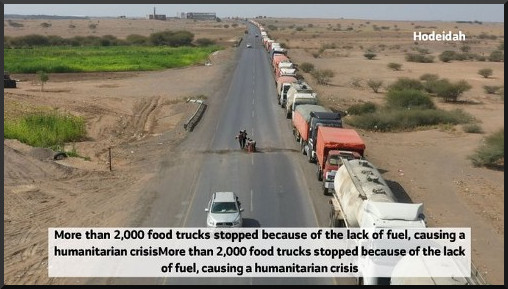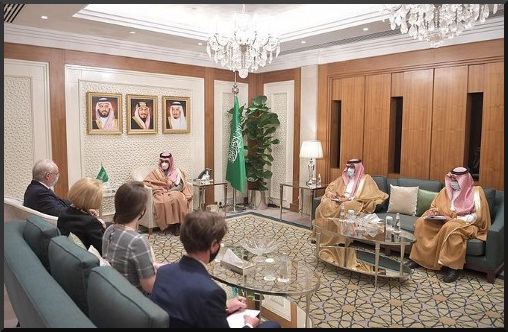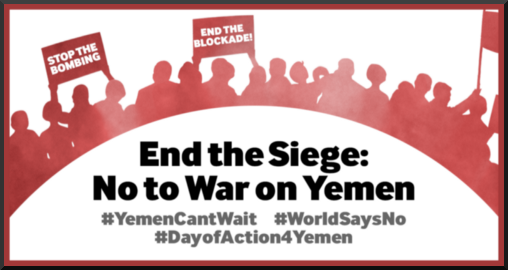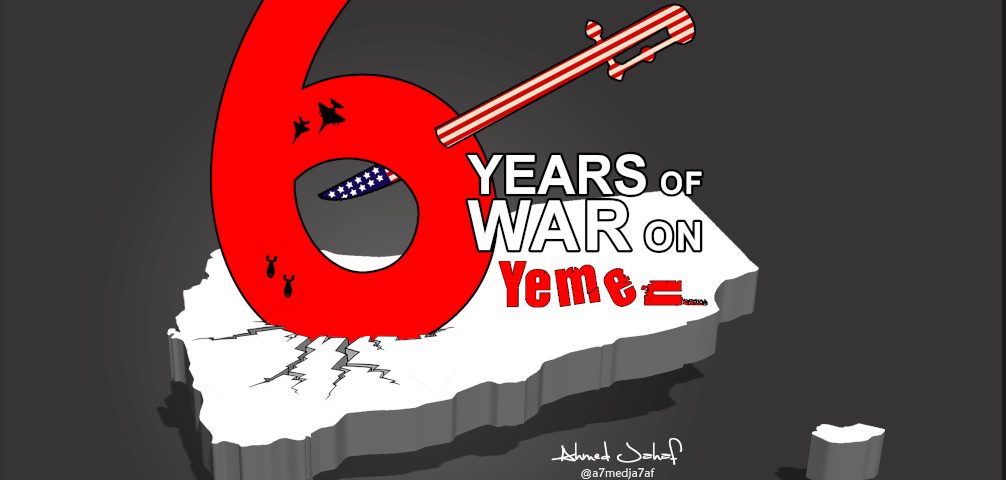by Azza Rojbi, published on Medium, March 29, 2021
February 15, 2021, marks one year since the Saudi-led coalition’s horrific air raid on a residential area in Yemen’s northern province of al-Jawf. The bombing killed 35 people, including 25 children, and 18 children were amongst the 23 injured. According to the Yemen Data Project,
“During 2020, air raids in #Yemen averaged 6 per day — double the average daily rate in 2019. Despite the pandemic, strikes hit healthcare facilities, markets, farms, schools, and vital water infrastructure, including water wells. At least one Covid-19 quarantine centre was bombed.”
The brutal U.S.-backed Saudi-led war on Yemen is approaching its sixth year, causing over 230,000 deaths, and plunging the country into the world’s worst humanitarian crisis. The airstrikes and bombing have destroyed homes, schools, hospitals, markets, and many other vital infrastructures. The destruction, combined with the land, sea, and air blockade imposed by Saudi Arabia, pushes Yemen to the brink of collapse. According to the United Nations, 2.3 million children under the age of five will suffer from acute malnutrition in 2021, of which 400,000 could die of starvation.
The humanitarian situation in Yemen is dire. Years of bombing and wars have destroyed over half of the hospitals in the country. The ones that are still functional lack the essential resources and medicine to provide adequate care to those in need. The Covid-19 pandemic threatens to make an already disastrous situation worse.
 Since the start of the war in 2015, the United States has provided full backing to the Saudi-led coalition, including technical support, training fighter jet pilots, targeting assistance, selling arms, and supplying military hardware. On February 4, 2021, U.S. President Joe Biden announced a new shift in the U.S. support for the Saudi-led war on Yemen. This announcement was welcomed as a positive step, and it seems that it created hope that the Biden administration is ending its support for the war on Yemen. Biden’s remarks were full of doublespeak and deceiving words. We have to be cautious and careful about what his announcement really means.
Since the start of the war in 2015, the United States has provided full backing to the Saudi-led coalition, including technical support, training fighter jet pilots, targeting assistance, selling arms, and supplying military hardware. On February 4, 2021, U.S. President Joe Biden announced a new shift in the U.S. support for the Saudi-led war on Yemen. This announcement was welcomed as a positive step, and it seems that it created hope that the Biden administration is ending its support for the war on Yemen. Biden’s remarks were full of doublespeak and deceiving words. We have to be cautious and careful about what his announcement really means.
Biden’s maneuvers and delay tactics
A closer examination of Biden’s speech reveals contradictory and confusing statements. “This war has to end. And to underscore our commitment, we are ending all American support for offensive operations in the war in Yemen, including relevant arms sales,” Biden said.
One wonders what Biden is referring to by, “offensive operations” and “relevant arms sales”? This ambiguous expression leaves the door open for the United States to continue its support for the war. Saudi Arabia has continuously framed its war on Yemen as defending itself and the region from the threat of Houthi rebels.
In the same address, Biden continues to say, “At the same time, Saudi Arabia faces missile attacks, UAV strikes, and other threats from Iranian-supplied forces in multiple countries. We’re going to continue to support and help Saudi Arabia defend its sovereignty and its territorial integrity and its people.” This language sounds very similar to that used by the Obama administration when it announced the start of Yemen’s war in 2015.
This rhetoric reinforces and validates the suspicion that Biden’s promise to end the war on Yemen is a sheer lie. His promise to end “relevant” arms sales is another example of doublespeak. It allows the United States to deflect criticism about their complicity in fueling the war on Yemen while finding ways to continue selling weapons to Saudi Arabia.
Absent from Biden’s remarks is any mention of ending U.S. drone strike operations in Yemen or lifting the cruel Saudi-led blockade against the people of Yemen. Overall, Biden’s words are a change of tone from the previous Trump administration, but they are hollow in substance. In response to the speech Saudi Arabia, Foreign Minister Prince Faisal Bin Farhan tweeted, “The Kingdom of Saudi Arabia welcomes the United States’ commitment, expressed in President Biden’s speech today, to cooperate with the Kingdom in defending its security and territory.”
How and why the war on Yemen started
March 26, 2021, marks 6 years of the inhuman and devastating war on Yemen. Backed by the United States, Saudi Arabia led a coalition of allied countries to militarily intervene in Yemen under the guise of restoring ‘legitimacy’ and ‘stability’ to Yemen and the region. Where is that legitimacy or peace today? They destroyed an entire country and caused the world’s worst humanitarian crisis.

The Saudi-led coalition never had the future or the well-being of the Yemeni people in mind! Their goal has been to crush any democratic aspirations of the Yemeni people and impose a puppet regime in the country that will serve Saudi Arabia and its Washington masters’ interests. Yemen’s strategic location is vital for the United States and imperialists to expand their military and economic hegemony over the Middle East and North Africa (MENA), as well as the East African region. Yemen’s coast borders the Bab el-Mandeb Strait, a narrow strategic waterway between the Horn of Africa and the Middle East connecting the Mediterranean Sea, Suez Canal, and the Red Sea to the Gulf of Aden, Arabian Sea, and the Indian Ocean. The strait is one of the most active and vital maritime shipping routes in the world.
Yemen is a land of rich history and ancient civilization; beautiful and complex culture; and resilient people. The potential of an independent, democratic, and powerful Yemen with its strategic location in the MENA region is a threat to the Saudi kingdom and its imperialist masters. In addition, the U.S., U.K., Canada, France, Germany, Italy and other European states made billions of dollars on arms sales and training contracts with Saudi Arabia and other countries in its military coalition.
As we approach the sixth year of the war, Saudi Arabia and its imperialist backers are stuck in a quagmire in Yemen. They were unsuccessful in restoring the power of widely unpopular puppet Abd-Rabbu Mansour Hadi and they failed to crush the resistance of the Yemeni people to foreign domination. The atrocities committed by the Saudi-led coalition are condemned internationally, and Saudi Arabia can no longer hide the horrific destruction and humanitarian crisis it caused in Yemen. Biden’s vague pledge to end the war on Yemen is a maneuver and delay tactic for the growing world-wide criticism against the war and Yemen’s dire humanitarian situation.
Building solidarity with Yemen
The overwhelming sentiment of people in Canada, the United States, and around the world are against Yemen’s war. This was evident at the successful Global Day of Action against the war on Yemen that took place on January 25, 2021. Tens of thousands of people in 28 countries joined the online virtual rally and the 30+ protests on the streets around the world. The coming together of anti-war activists and peace-loving people from across the globe to stand against the war in Yemen is inspiring!
 We need to build on this momentum and continue educating, organizing, and mobilizing against the war in Yemen. Coordinated and consistent local and international actions and campaigns are vital to keeping the pressure on our respective governments. Here in Canada, we need to raise the issue of Yemen among working and oppressed people, student unions, political groups, labour unions, civil society organizations and mobilize all peace-loving people to demand that Prime Minister Justin Trudeau’s Liberal government ends all its arms sales to Saudi Arabia.
We need to build on this momentum and continue educating, organizing, and mobilizing against the war in Yemen. Coordinated and consistent local and international actions and campaigns are vital to keeping the pressure on our respective governments. Here in Canada, we need to raise the issue of Yemen among working and oppressed people, student unions, political groups, labour unions, civil society organizations and mobilize all peace-loving people to demand that Prime Minister Justin Trudeau’s Liberal government ends all its arms sales to Saudi Arabia.
There cannot be peace in Yemen without an immediate ending of all arms sales to Saudi Arabia and its coalition. There will be no peace in Yemen without the withdrawal of all foreign troops and mercenaries. To end the humanitarian disaster in Yemen, the Saudi blockade must be ended fully and immediately so that the desperately needed humanitarian aid can freely flow to Yemen. Any real solution needs to include all Yemeni voices without any foreign interventions or coercion. The Yemeni people deserve to determine the future of their country freely. Self-determination is a fundamental right of any sovereign nation.
Featured Image: Drawn by Ahmad Jahaf, @a7medja7af Cropped
Article originally published in the Fire This Newspaper
Azza Rojbi is a Tunisian social justice activist, author and researcher in Vancouver, Canada. She is a member of the Executive Committee of Vancouver’s antiwar coalition Mobilization Against War and Occupation (MAWO) and author of the book “U.S. and Saudi Arabia War on the People of Yemen” (Battle of Ideas Press, April 2019).
